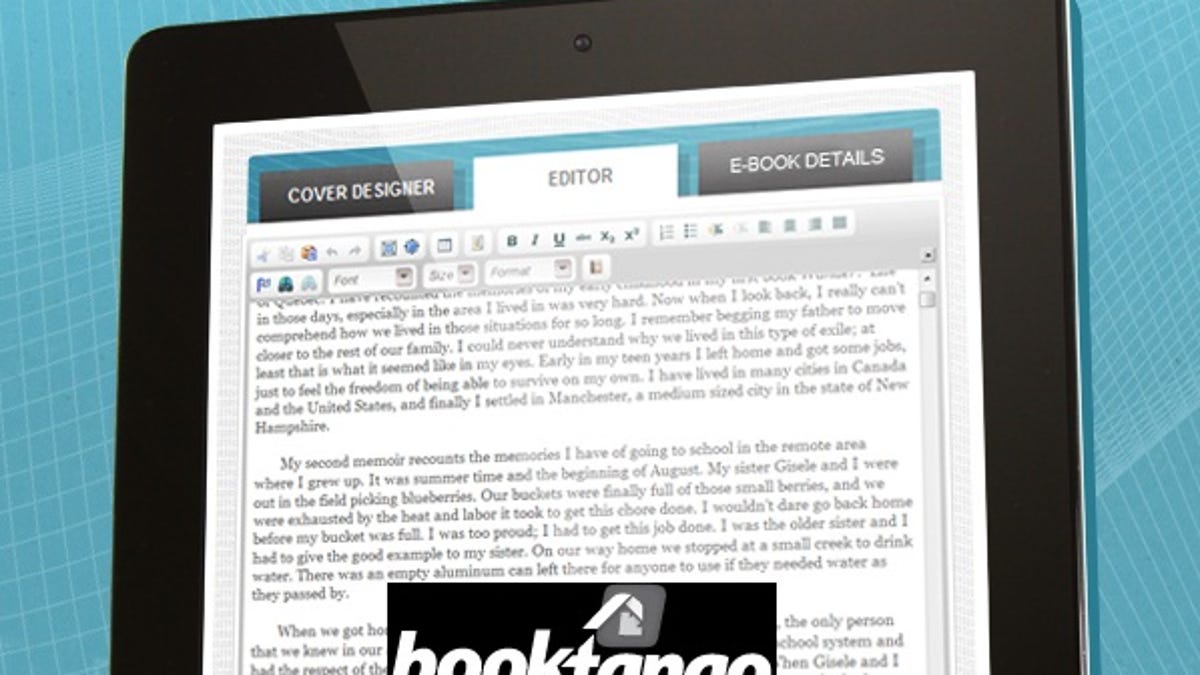 Why You Can Trust CNET
Why You Can Trust CNET Author Solutions dances into the DIY e-book market with Booktango
Booktango is a new easy-to-use free DIY self-publishing platform that allows you to publish your e-book to all the major e-bookstores. What's the rub?
With the boom in e-readers, self-publishing has become big business, and Author Solutions, one of the largest self-publishers in the U.S., has entered the DIY e-book market in a big way with Booktango.
Whether Booktango should be called an "e-book generating app" or "self-publishing platform" is hard to say, but it basically provides a free and simple way to upload your manuscript, edit it for proper formatting, then automatically serve it up to various e-bookstores, including Kindle, Nook, Kobo, and iBooks.
On the surface, Booktango, which bears the "beta" tag, looks fairly slick and should improve as the company adds more features. The ability to have WYSIWYG formatting capabilities is really nice (even on the iPad) and you can either upload a cover image of your own choosing or design one using some provided templates. All in all, it looks like a good and easy way to get your e-book formatted and distributed to all the major e-bookstores quickly. Booktango also manages your e-book sales--it rolls them all up into one account--and you can have your royalties sent directly to your checking account. (You can't track book sales yet, but that feature will soon be added to the "dashboard").
But there's a rub, as often there is with self-publishing companies.
Yes, Booktango is free to use, but the company is working off a freemium model and provides additional fee-based services, such as copy editing, custom cover design, and marketing packages. That's fine and par for the self-publishing course. But where things get a little dicier is with royalty rates.
The Booktango Web site advertises a "100% royalty," which is misleading considering you get that rate only from the e-books you sell on the Booktango Web site and Booktango charges a fee for each book you sell (30 percent of the list price--the same as Amazon). For other outlets, Booktango takes 10 percent of your net profits, resulting in a "90-percent royalty."
As you can see from the sample royalty rates, you end up making $1.62 on a $4.99 book. That's actually quite bad.
If you were to sell your e-book in the Kindle Store using Amazon's Kindle Direct Publishing (KDP), you could earn a 70 percent royalty on that $4.99. Amazon charges a minor delivery fee (a few cents) for each e-book sold, but you'd basically make around $3.45 for each unit you sold at that price (as long as you're selling to people who live in the countries listed here).
I'm not going to get into how going exclusive with Amazon allows you to open your book up to free lending for Prime members and still collect a royalty (see details here). But the point is, going through an intermediary like Booktango does significantly shave your royalties.
The other issue is pricing flexibility and being able to price your book cheaply enough. Most self-published e-books that are selling well are priced at 99 cents. It's unclear whether you could even price your e-book at 99 cents and make any money (you only get a 35 percent royalty from Amazon if you price below $2.99).
When I asked a Booktango rep about pricing, I got this response:
"We do offer the ability to set pricing, although right now it is manual by contacting our customer service through our 24-7 chat support," he said. "Our default price is $4.99. In the next few weeks we'll be launching a capability to set price within the application."
I also asked for a quote from Kevin Weiss, CEO of Booktango's parent company, Author Solutions, on why Booktango was better than some competing services out there. Weiss had this to say:
"We have been looking at the DIY e-book publishing space for some time. When the time was right for us enter the market, we asked the question--what will it take to be best in class? Our research told us that people want an easy-to-use platform that allows them to correct the formatting errors which can make publishing e-books extremely frustrating. They also want distribution to all the major e-readers and they want to keep the lion's share of the royalties. With Booktango, we believe we have exceeded all of those expectations."While I think that Booktango has fulfilled its promise of being an easy-to-use platform with a lot of nice features, the royalty equation certainly isn't best in class (Smashwords offers better royalty rates but is no-frills). True, if you're someone who doesn't care so much about maximizing your profits and just want to get your e-book up and out there to all the e-book sellers without paying any money to have it professionally formatted, Booktango is definitely worth checking out.
But the only way to get the true "lion's share" is to publish directly through Amazon (or Barnes & Noble). It would be false advertising to suggest otherwise.
Update: After this article was posted, I got a note from Keith Ogorek, SVP of marketing for Author Solutions. He said he'd read the article and noticed that the calculation on the sample royalty was wrong. The correct amount for the royalty is $2.52 (Booktango has since made the correction on its Web site). Ogorek also said the example is not specifically for the Kindle Store. "We did not single out any particular retailer because one of the benefits of Booktango is distribution to every device," he said. "Certainly if an author only wants to be on one device or manage all the relationships himself, he can do that and possibly earn higher royalties. Booktango takes all that hassle away and still allows distribution everywhere and to everybody."


